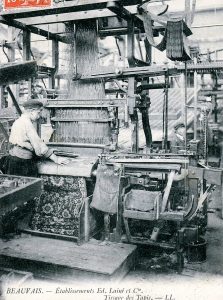While reading Marx, I found really interesting the way he opens chapter 15 by quoting John Stuart:” It’s really questionable if all mechanical inventions yet made have lightened the day’s toil of any human being.” This preliminary assumption gives the tone of the book section, as the author keeps on reformulating that premise in different ways…

I would like us to reflect on the above excerpt, from section 5: “The Strife Between Workman and Machine”:
“Abbé Lancellotti, in a work that appeared in Venice in 1636, but which was written in 1579, says as follows:’Anthony Muller of Danzig saw about 50 years ago in that , a very ingenuous machine, which weaves 4 to 6 pieces at once. But the Mayor being apprehensive that this invention might throw a large number of workmen on the streets, caused the inventor to be secretly strangled or drowned”
What does the Mayor’s reaction to innovation reveal about the Early-Modern conception of machinery? In what specific way that invention could have led to underemployment? Which tools make that machine “ingenuous”? For which purpose(s) is Marx quoting Lancellotti more than two century later- especially after the Industrial revolution? Do contemporary men react or ‘have to react’ like the Mayor towards incessantly innovative and competitive forms of “machinery”?



I noted this quotation from the reading, “The instrument of labour, when it takes the form of a machine, immediately becomes a competitor of the workman himself.”
I was thinking that the same concern is held today, but with the technological revolution it’s not just the manually laboring class that is competing with machines for jobs. It’s a point I’ve considered in my own life, e.g., as I choose human cashiers instead of self-checkout in supermarkets, hoping I am saving someone’s job.
Funny, though, how in the self-checkout lines, there is always a staff member helping people navigate the technology. We, and our industrial counterparts, service the machines as much as we are served by them.
Did anyone else take pleasure from this passage?:
“No sooner had Everet in 1758 erected the first wool-shearing machine that was driven by water-power, than it was set on fire by 100,000 people who had been thrown out of work.”
#burnitdown
Jenna and Blondie Natacha, I did take pleasure in that passage and the origins of the Luddite Movement. I also liked how Marx points out that “it took time and experience for workers to distinguish between machinery and its employment by capital, and therefore transfer their attacks from the material instruments of production to the form of society [i.e. capitalists] which utilize/s those instruments.” I also liked the way David Harvey pointed out this distinction in his lectures regarding the cause/s of ‘displacement of labor’: is it the MACHINE or the APPLICATION OF THE MACHINE by CAPITALISTS? A very relevant polemic today as we approach robotic culture, which I do hope will always require a human to supervise and therefore give/keep a job to a person, as you noted.